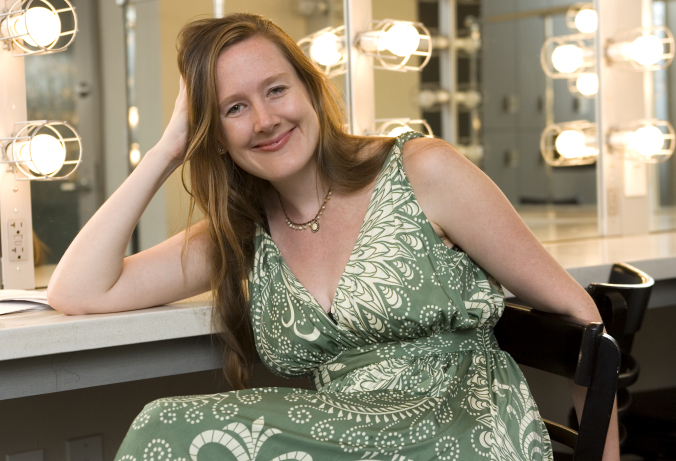
Sarah Ruhl’s plays include Scenes from Court Life, For Peter Pan on her 70th Birthday, The Oldest Boy, In the Next Room, or the vibrator play, The Clean House, Eurydice, Dead Man’s Cell Phone, A Melancholy Play, Orlando, Late: a cowboy song, Dear Elizabeth and Stage Kiss. She is a two-time Pulitzer Prize finalist and a Tony Award nominee. Her plays have been produced on Broadway at the Lyceum by Lincoln Center Theater, off-Broadway at Playwrights Horizons, Second Stage, and at Lincoln Center’s Mitzi Newhouse Theater.
Her plays have been produced regionally all over the country and have also been produced internationally, and translated into over twelve languages. Ms. Ruhl received her M.F.A. from Brown University where she studied with Paula Vogel.
She has received the Susan Smith Blackburn award, the Whiting award, the Lily Award, a PEN award for mid-career playwrights, and the MacArthur “genius” award.
Her book of essays 100 Essays I Don’t Have Time to Write was published by Faber and Faber last fall. She teaches at the Yale School of Drama and lives in Brooklyn with her family.
Your dialogue often reads like poetry, filled with poetic lines breaks and metaphors. How did you develop your unique writing style?
I started out as a poet, became a playwright, and kept going. I think playwriting contains all other genres, including poetry, the essay (or argument), story, song… And it’s one thing that draws me to the form again and again — the way it folds all the other genres in.
Your subject matter is bold, wild, and eclectic, blending fantasy and realism. What draws you to the subjects you write about?
It’s a little mysterious. Sometimes an image, sometimes an idea, sometimes a feeling I can’t seem to excise.
While your plays explore heavy topics, they are also very comedic, with a whimsical sense of humor that explores the absurdity of life. What role does comedy play in your works?
I can’t separate comedy and tragedy. I think they are as mutually dependent as the muscle and the bone in terms of getting a leg or a play to move.
Your latest play, “Scenes From Court Life, or the Whipping Boy and His Prince,” will premiere on September 30th at Yale Repertory Theatre. Can you tell us about the process of writing this play?
It was a wonderfully insane process. It was based on the joint-stock model that Caryl Churchill used for plays like Cloud Nine. Mark Wing-Davey, the director, used that model with Caryl in England and now he uses it at NYU. He invites writers to write plays for specific ensembles, and the actor’s help do the research. In this case, I asked the group to research American political dynasties, sibling rivalry, and whipping boys.
Your plays explore several ideas from earlier times. You have said your plays are “pre-Freudian,” and they explore ideas like melancholia and the humours (“A Melancholy Play”), Victorian hysteria (“In the Next Room (or The Vibrator Play)”), or Greek Mythology (“Eurydice”). What draws you to these themes?
I think looking back can help us frame our own historical moment, can help us see what is staring us in the face.
Pulitzer-Prize winning playwright Paula Vogel was your playwriting teacher when you attended Brown, and you have continued to have a relationship with Vogel long after your time at Brown. How have teachers like Vogel influenced you?
Paula quite simply made me a playwright.
You are a teacher of playwriting and theatre and Yale. How has your teaching influenced your writing?
Teaching has made me, I hope, more forgiving. I don’t know if that quality has made its way into my writing. I think teaching also makes one more objective in the sense that Chekhov speaks about. Chekhov said he began to write more objectively after he did his medical training. I think teaching is similar. I think the word objective can be misconstrued—what I mean is a quality of observation that is more sympathetic and less solipsistic.
What inspires you?
People who are both humble and brazen. Kindness. Rain. My family.
What kind of theatre excites you?
Theater that surprises me. The most surprising play I’ve seen in the last couple of years was An Octoroon by Branden Jacobs-Jenkins. Theater that moves me—like Julia Cho’s Aubergine, or Lisa Kron’s Fun Home. And Hamilton surprises me and moves me on a cellular level.
What advice do you have for playwrights starting out?
Read more, walk more, love more.
Would you like to share any projects you are working on now, besides “Scenes From Court Life, or the Whipping Boy and His Prince?”
I’m also working on a musical with Elvis Costello and a new play called How to Transcend a Happy Marriage.
